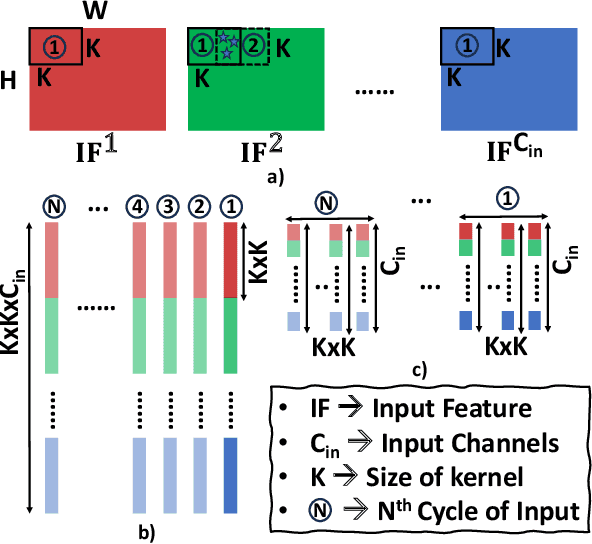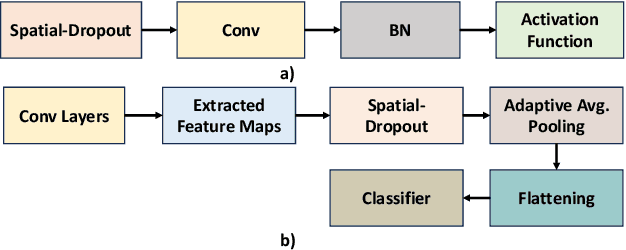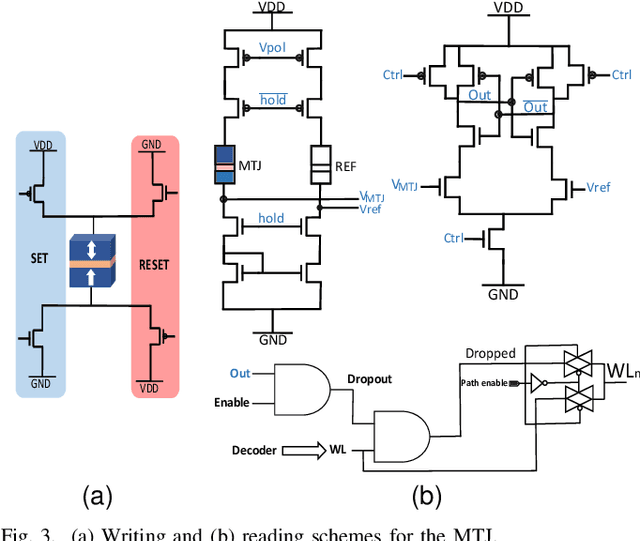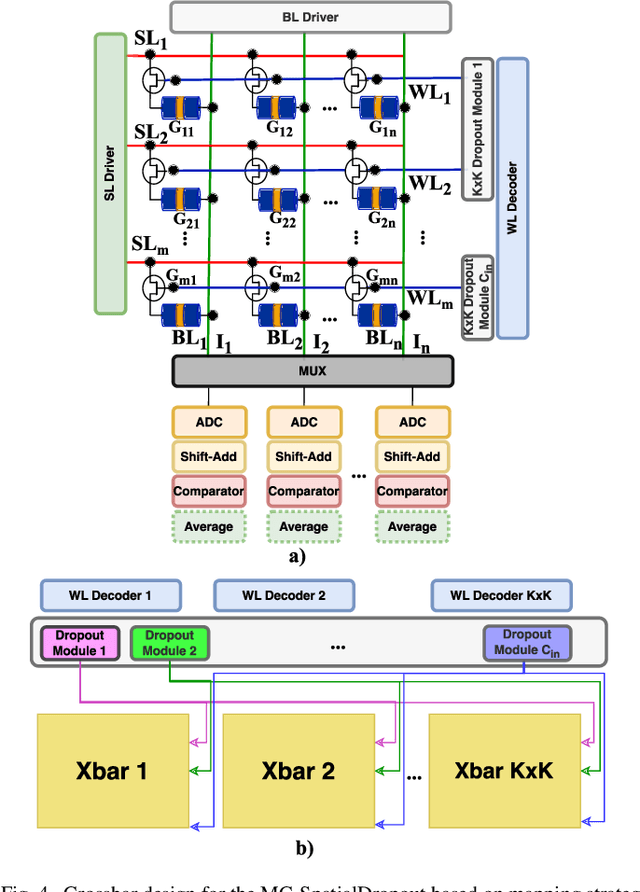Lorena Anghel
Enhancing Reliability of Neural Networks at the Edge: Inverted Normalization with Stochastic Affine Transformations
Jan 23, 2024Abstract:Bayesian Neural Networks (BayNNs) naturally provide uncertainty in their predictions, making them a suitable choice in safety-critical applications. Additionally, their realization using memristor-based in-memory computing (IMC) architectures enables them for resource-constrained edge applications. In addition to predictive uncertainty, however, the ability to be inherently robust to noise in computation is also essential to ensure functional safety. In particular, memristor-based IMCs are susceptible to various sources of non-idealities such as manufacturing and runtime variations, drift, and failure, which can significantly reduce inference accuracy. In this paper, we propose a method to inherently enhance the robustness and inference accuracy of BayNNs deployed in IMC architectures. To achieve this, we introduce a novel normalization layer combined with stochastic affine transformations. Empirical results in various benchmark datasets show a graceful degradation in inference accuracy, with an improvement of up to $58.11\%$.
NeuSpin: Design of a Reliable Edge Neuromorphic System Based on Spintronics for Green AI
Jan 11, 2024Abstract:Internet of Things (IoT) and smart wearable devices for personalized healthcare will require storing and computing ever-increasing amounts of data. The key requirements for these devices are ultra-low-power, high-processing capabilities, autonomy at low cost, as well as reliability and accuracy to enable Green AI at the edge. Artificial Intelligence (AI) models, especially Bayesian Neural Networks (BayNNs) are resource-intensive and face challenges with traditional computing architectures due to the memory wall problem. Computing-in-Memory (CIM) with emerging resistive memories offers a solution by combining memory blocks and computing units for higher efficiency and lower power consumption. However, implementing BayNNs on CIM hardware, particularly with spintronic technologies, presents technical challenges due to variability and manufacturing defects. The NeuSPIN project aims to address these challenges through full-stack hardware and software co-design, developing novel algorithmic and circuit design approaches to enhance the performance, energy-efficiency and robustness of BayNNs on sprintronic-based CIM platforms.
Testing Spintronics Implemented Monte Carlo Dropout-Based Bayesian Neural Networks
Jan 09, 2024



Abstract:Bayesian Neural Networks (BayNNs) can inherently estimate predictive uncertainty, facilitating informed decision-making. Dropout-based BayNNs are increasingly implemented in spintronics-based computation-in-memory architectures for resource-constrained yet high-performance safety-critical applications. Although uncertainty estimation is important, the reliability of Dropout generation and BayNN computation is equally important for target applications but is overlooked in existing works. However, testing BayNNs is significantly more challenging compared to conventional NNs, due to their stochastic nature. In this paper, we present for the first time the model of the non-idealities of the spintronics-based Dropout module and analyze their impact on uncertainty estimates and accuracy. Furthermore, we propose a testing framework based on repeatability ranking for Dropout-based BayNN with up to $100\%$ fault coverage while using only $0.2\%$ of training data as test vectors.
Scale-Dropout: Estimating Uncertainty in Deep Neural Networks Using Stochastic Scale
Nov 27, 2023



Abstract:Uncertainty estimation in Neural Networks (NNs) is vital in improving reliability and confidence in predictions, particularly in safety-critical applications. Bayesian Neural Networks (BayNNs) with Dropout as an approximation offer a systematic approach to quantifying uncertainty, but they inherently suffer from high hardware overhead in terms of power, memory, and computation. Thus, the applicability of BayNNs to edge devices with limited resources or to high-performance applications is challenging. Some of the inherent costs of BayNNs can be reduced by accelerating them in hardware on a Computation-In-Memory (CIM) architecture with spintronic memories and binarizing their parameters. However, numerous stochastic units are required to implement conventional dropout-based BayNN. In this paper, we propose the Scale Dropout, a novel regularization technique for Binary Neural Networks (BNNs), and Monte Carlo-Scale Dropout (MC-Scale Dropout)-based BayNNs for efficient uncertainty estimation. Our approach requires only one stochastic unit for the entire model, irrespective of the model size, leading to a highly scalable Bayesian NN. Furthermore, we introduce a novel Spintronic memory-based CIM architecture for the proposed BayNN that achieves more than $100\times$ energy savings compared to the state-of-the-art. We validated our method to show up to a $1\%$ improvement in predictive performance and superior uncertainty estimates compared to related works.
Spatial-SpinDrop: Spatial Dropout-based Binary Bayesian Neural Network with Spintronics Implementation
Jun 16, 2023



Abstract:Recently, machine learning systems have gained prominence in real-time, critical decision-making domains, such as autonomous driving and industrial automation. Their implementations should avoid overconfident predictions through uncertainty estimation. Bayesian Neural Networks (BayNNs) are principled methods for estimating predictive uncertainty. However, their computational costs and power consumption hinder their widespread deployment in edge AI. Utilizing Dropout as an approximation of the posterior distribution, binarizing the parameters of BayNNs, and further to that implementing them in spintronics-based computation-in-memory (CiM) hardware arrays provide can be a viable solution. However, designing hardware Dropout modules for convolutional neural network (CNN) topologies is challenging and expensive, as they may require numerous Dropout modules and need to use spatial information to drop certain elements. In this paper, we introduce MC-SpatialDropout, a spatial dropout-based approximate BayNNs with spintronics emerging devices. Our method utilizes the inherent stochasticity of spintronic devices for efficient implementation of the spatial dropout module compared to existing implementations. Furthermore, the number of dropout modules per network layer is reduced by a factor of $9\times$ and energy consumption by a factor of $94.11\times$, while still achieving comparable predictive performance and uncertainty estimates compared to related works.
 Add to Chrome
Add to Chrome Add to Firefox
Add to Firefox Add to Edge
Add to Edge